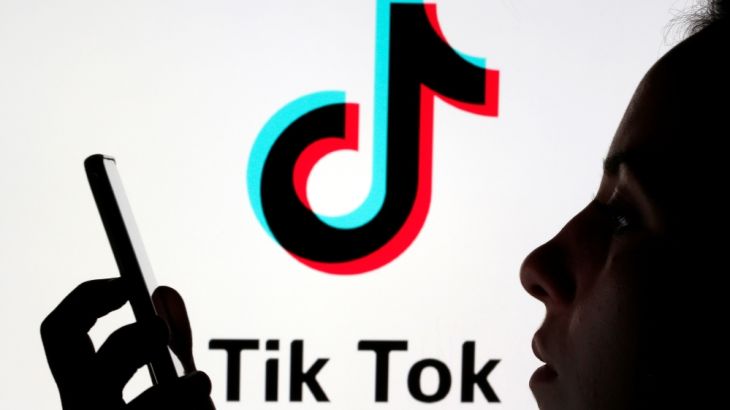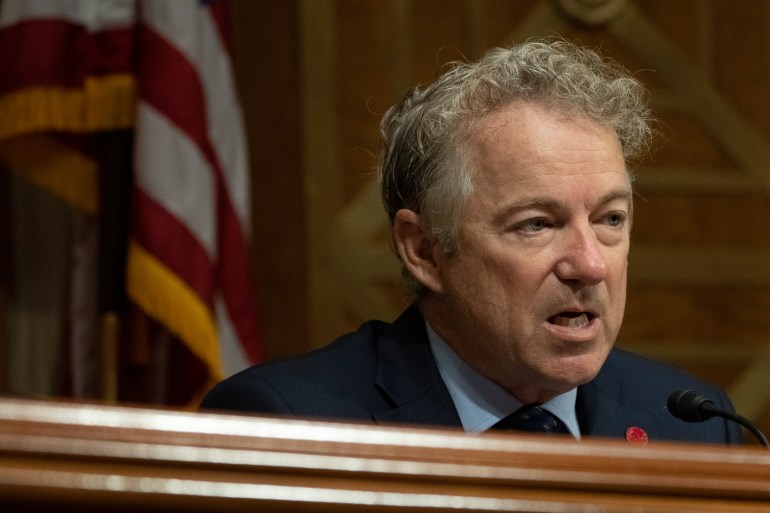Republican Senator Rand Paul blocks bid to ban TikTok in US
A small but growing number of Democrats and Republicans raise concerns, citing free speech, to object to legislation targeting TikTok.

US Senator Rand Paul has blocked a bid to fast-track a ban of TikTok, citing concerns about free speech and uneven treatment of social media companies.
The app, which was founded by Chinese entrepreneurs, has more than 150 million monthly users in the United States, mostly young people.
Keep reading
list of 3 itemsFrance bans ‘recreational’ use of TikTok, Twitter, Instagram
Why is the US concerned about TikTok?
“I think we should beware of those who use fear to coax Americans to relinquish our liberties,” Paul, a Republican, said on the Senate floor on Wednesday. “Every accusation of data gathering that has been attributed to TikTok could also be attributed to domestic big tech companies.”
Republican Senator Josh Hawley had sought unanimous consent for a TikTok ban bill.
“It protects the American people and it sends a message to Communist China that you cannot buy us,” Hawley had said, alleging that the app was spying on people in the US.

TikTok says it has spent more than $1.5bn on rigorous data security efforts and rejects spying allegations. Last week, its chief executive officer, Shou Zi Chew, appeared before Congress and faced tough questions about national security concerns over the app.
At the hearing, Chew attempted to dispel concerns over TikTok’s ties to the Chinese government and its alleged inability to stem “harmful” content. He also sought to portray the app as “a place where people can be creative and curious” and said the company was taking actions that go beyond industry standards in terms of data protection and transparency.
House Speaker Kevin McCarthy, a Republican, said last week he expects the house will take up a bill to address TikTok but the timing is unclear. It is also not clear what a final bill to address TikTok might look like.
A small but growing number of Democrats and Republicans have raised concerns, citing free speech and other issues, and have objected to legislation targeting TikTok as overly broad.
“If Republicans want to continuously lose elections for a generation they should pass this bill to ban TikTok,” Paul said during his Senate speech. “Do we really want to emulate Chinese speech bans?” he added. “We’re going to be just like China and ban speech we’re afraid of?”
On Friday, Democratic Representative Alexandria Ocasio-Cortez in a TikTok video had also opposed a ban, as do free-speech groups such as the American Civil Liberties Union.
Calling such a move “unprecedented”, Ocasio-Cortez said Congress has not gotten classified TikTok briefings. “It just doesn’t feel right to me,” she said.
Earlier this month, the administration of President Joe Biden, a Democrat, demanded TikTok’s Chinese owners divest their stakes or face a US ban. In 2020, attempts by then-Republican President Donald Trump to ban TikTok were blocked by US courts.
Many Democrats argue Congress should pass comprehensive privacy legislation covering all social media sites, not just TikTok.
Senators Mark Warner, a Democrat, and Republican John Thune have proposed the RESTRICT Act, which now has 22 Senate cosponsors, to give the Commerce Department the power to impose restrictions up to and including banning TikTok and other technologies that pose national security risks. It would apply to foreign technologies from China, Russia, North Korea, Iran, Venezuela and Cuba.
Paul said the bill “would basically be a limitless authority for the president to ban speech”.
A growing number of conservatives oppose the measure. Former Republican Representative Justin Amash said the “RESTRICT Act isn’t about banning TikTok; it’s about controlling you. It gives broad powers to the executive branch, with few checks, and will be abused in every way you can imagine.”
A string of governments and institutions in recent weeks have taken action to limit TikTok’s use. Among them are the White House, the UK parliament, the Dutch and Belgian administrations, the New Zealand parliament, and the governments of Canada, India, Pakistan, Taiwan and Jordan.
At the same time, US lawmakers are weighing the renewal of powers that force US tech giants such as Google, Meta and Apple to facilitate unlimited spying on non-US citizens abroad.
Section 702 of the Foreign Intelligence Surveillance Act, which the US Congress must vote to reauthorise by December to prevent it from lapsing under a sunset clause, allows US intelligence agencies to carry out warrantless spying on foreigners’ email, phone and other online communications.
While US citizens have some protections against warrantless searches under the Constitution, the government has maintained that these rights do not extend to foreigners overseas, giving its agencies practically free rein to snoop on their communications. Information may also be turned over to US allies like the United Kingdom and Australia.
“It is a case of ‘rules for thee but not for me,’” Asher Wolf, a tech researcher and privacy advocate based in Melbourne, Australia, told Al Jazeera.
“So the noise the Americans are making about TikTok must be seen less as a sincere desire to protect citizens from surveillance and influence operations, and more as an attempt to ring-fence and consolidate national control over social media,” Wolf said.